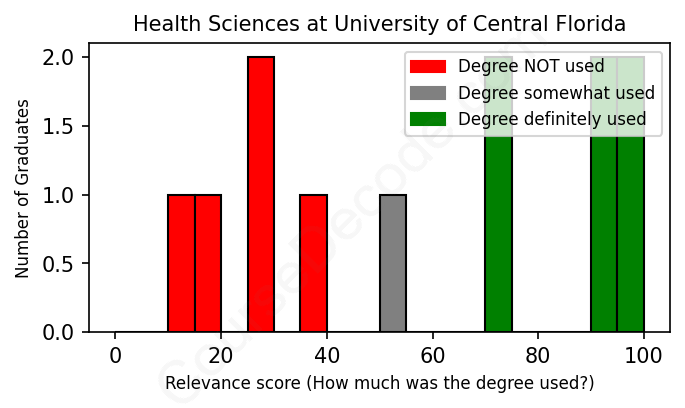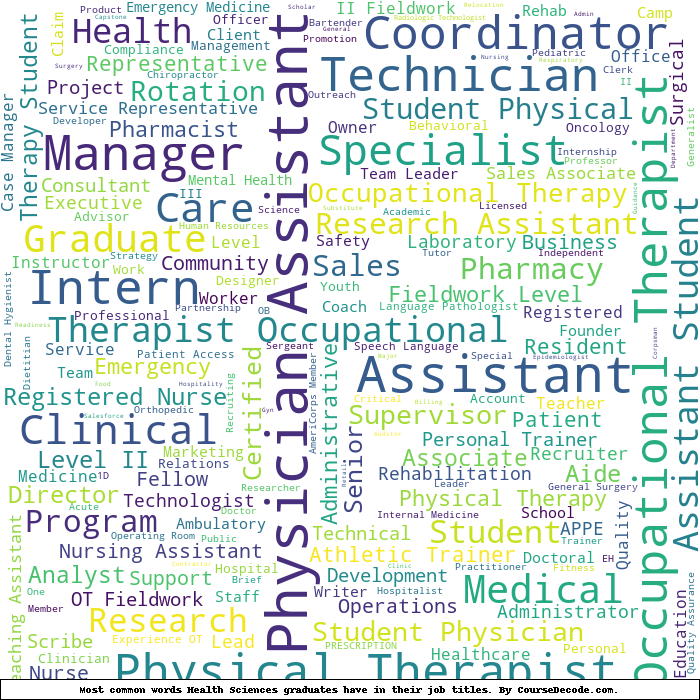
First, some facts. Of the Health Sciences graduates from University of Central Florida we've analyzed , here's how many have used (or NOT used) their degree in their career:

These are estimates based on AI analysis of 12 LinkedIn profiles (see below).
The verdict? Below average. Overall, with an average relevance score of 57%, Health Sciences graduates from University of Central Florida have a lower likelihood (-10%) of finding work in this field compared to the average graduate across all fields:
And for comparison, here's the chart for all profiles we've looked at across all degrees.
Also, after graduating, 66% of these graduates have pursued further education other than another Bachelor's degree (such as a Masters degree or other), compared to the average across all profiles of 35%. This suggests you may need more than just a Bachelors degree to be competitive as a Health Sciences graduate.
See the details:
|
Relevance score: 13% We think this person has NOT gone into a career related to their degree. We think this person has NOT gone into a career related to their degree.
DEGREE INFOGraduated in 2021 from University of Central Florida with a Bachelor of Science - BS in Health Sciences. Also pursued further education since (see below). JOB HISTORY SINCE GRADUATIONCash Coordinator Golden Spoon Diner May 2021 - Apr 2022 FOH Manager  Golden Spoon Diner May 2022 - Feb 2023 Sales Associate  America's Best Contacts & Eyeglasses Feb 2023 - Dec 2023 Asscociate Recruiter  Ascendo Healthcare Dec 2023 - Apr 2024 Recruiting Manager  Veritas Recruiting Group May 2024 - Present FURTHER DEGREES DONE SINCE GRADUATINGMaster of Business Administration - MBAUniversity of Central Florida 2023 - 2025 ABOUTPassionate and adaptable professional with a diverse background spanning healthcare, hospitality, and leadership roles. Graduated with a Bachelor's in Health Science and currently pursuing an MBA while leveraging valuable experience in client relations and leadership. Eager to connect and collaborate with like-minded professionals in various industries. |
The top 10 most common jobs done by the graduates we've analyzed (ranked most common to least) are:
After analyzing the LinkedIn profiles of individuals who graduated with a degree in Health Sciences from the University of Central Florida, it seems that many of the common job roles people have taken on are quite varied. While there are notable roles that directly relate to health sciences—like those of Physician Assistant Students and Physical Therapists—many others are in customer service, administrative functions, or even sales positions. These latter roles often do not leverage the specific knowledge gained during their studies, as they focus on skills that can be widely applicable across various industries rather than specialized health knowledge.
Overall, it's a mixed bag in terms of relevance to Health Sciences. Some graduates do find jobs like Physician Assistant or internships where they can directly apply their health sciences education in a clinical context, which is fantastic. However, it’s not uncommon to see many graduates landing positions in customer service or management that have pretty much nothing to do with health sciences at all. This suggests that while the degree provides a solid foundation in understanding health-related topics, it may not always lead graduates straight into health-focused roles, at least not initially. It underscores the importance of being proactive in seeking out positions that align closely with one's academic background in health sciences if that's the desired career path.
Here is a visual representation of the most common words in job titles for Health Sciences graduates (this is across all Health Sciences graduates we've analyzed, not just those who went to University of Central Florida):

Based on the LinkedIn profiles of graduates from the University of Central Florida with degrees in Health Sciences, it looks like these individuals have taken quite a variety of paths. Many of them seem to start off in entry-level roles that might not directly relate to health sciences, such as customer service or administrative positions. For example, some graduates began their careers as customer service representatives or fiscal assistants. Over the first few years, we can see a trend towards more specialized healthcare roles, like physician assistant positions, medical scribes, and various roles in departments of health and environmental control.
As time goes on, specifically around the 5 to 10 year mark, many graduates appear to settle into roles that are directly tied to health sciences, often in clinical capacities like physician assistants, physical therapists, or even pharmacists. A few also branch out into related fields, such as healthcare administration or research, indicating a growing professional maturity and specialization. While there are a few examples of graduates drifting toward unrelated sectors like technical recruiting or customer service management, the majority of those who stayed within the healthcare realm seem to be forging successful careers that align well with their health sciences education. Overall, it looks like a solid degree choice for those committed to pursuing a career in the health field, especially if they are willing to start in less specialized roles and work their way up.
So, a Bachelor’s degree in Health Sciences can be a mixed bag, depending on your interests and strengths. At UCF, like at other schools, it usually has a solid balance of coursework that covers topics like biology, public health, and even some social sciences. It’s definitely not a walk in the park—there’s a good amount of memorization and critical thinking involved, especially if you're not super into science. Students often find it challenging but manageable if they stay organized and keep up with their studies. Overall, it’s about average in terms of difficulty, but it can feel a lot tougher if you’re not into the subjects. If you’re passionate about health and helping others, though, you might find it a bit more enjoyable!
Most commonly, in the LinkedIn profiles we've looked at, it takes people 4 years to finish a Bachelor degree in Health Sciences.
So, looking at these UCF Health Sciences grads, it seems like they're on pretty standard career paths, but the money aspect varies quite a bit. The earlier roles, like customer service and assistant positions, probably didn't pay too well, especially at the start. However, as they progressed into roles like Physician Assistant or Operations Manager, you can bet their salaries climbed significantly—those positions usually offer decent pay. The ones in specialized fields, like epidemiology or pharmacy, are likely doing pretty well, too. Overall, it seems like most of them are moving up the ladder and will end up making decent money, though their early jobs might not have been a lucrative start.
Here is a visual representation of the most common words seen in the "about" section of LinkedIn profiles who have a Bachelor degree in Health Sciences (this is across all Health Sciences graduates we've analyzed, not just those who went to University of Central Florida). This may or may not be useful:

Here are all colleges offering a Bachelor degree in Health Sciences (ordered by the average relevance score of their Health Sciences graduates, best to worst) where we have analyzed at least 10 of their graduates:
| College | Score | Count |
|---|---|---|
 James Madison University James Madison University
|
83 | 13 |
 University of South Florida University of South Florida
|
72 | 17 |
 University of Central Florida University of Central Florida
|
57 | 12 |